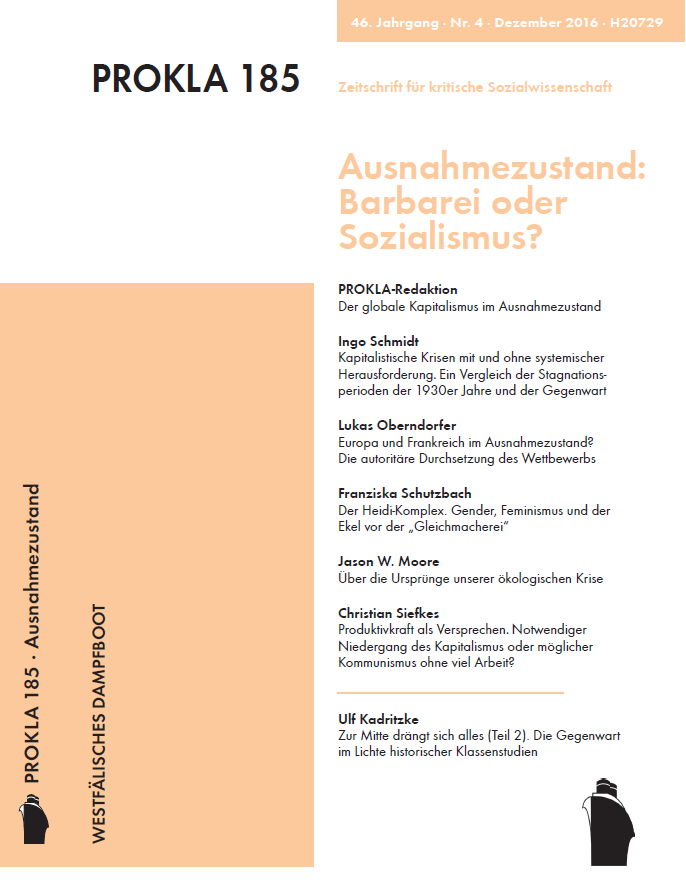Kapitalistische Krisen mit und ohne systemischer Herausforderung.
Ein Vergleich der Stagnationsperioden der 1930er Jahre und der Gegenwart
DOI:
https://doi.org/10.32387/prokla.v46i185.130Schlagworte:
Krise, Krisentheorie, Great DepressionAbstract
This article draws on Marxist theories of crises, imperialism, and class formation to identify commonalities and differences between the stagnation of the 1930s and today. Its key argument is that the anti-systemic movements that existed in the 1930s and gained ground after the Second World War pushed capitalists to turn from imperialist expansion and rivalry to the deep penetration of domestic markets. By doing so they unleashed strong economic growth that allowed for social compromise without hurting profits. Yet, once labour and other social movements threatened to shift the balance of class power into their favor, capitalist counter-reform began. In its course, global restructuring, and notably the integration of Russia and China into the world market, created space for accumulation. The cause for the current stagnation is that this space has been used up. In the absence of systemic challenges capitalists have little reason to seek a major overhaul of their accumulation strategies that could help to overcome stagnation. Instead they prop up profits at the expense of the subaltern classes even if this prolongs stagnation and leads to sharper social divisions.
Downloads
Literaturhinweise
Amin, Samir (2010): The Law of Worldwide Value. New York.
Bond, Patrick/Garcia, Ana (Hg.) (2015): BRICS - An Anticapitalist Critique. Chicago.
Broadberry, Stephen/Harrison, Mark (Hg.) (2005): The Economics of World War. Cambridge. https://doi.org/10.1017/CBO9780511497339
Desai, Radhika (2010): Consumption Demand in Marx and the Current Crisis. In: Research in Political Economy 26: 101-143. https://doi.org/10.1108/S0161-7230(2010)0000026005
Eichengreen, Barry (1992): Golden Fetters - The Gold Standard and the Great Depression, 1919-1939. Oxford.
- (2012): Das Ende des Dollar-Privilegs. Kulmbach.
Fisher, Irving (1933): The Debt-Deflation Theory of Great Depressions. In: Econometrica 1(4): 190-207. https://doi.org/10.2307/1907327
Goldberg, Jörg (2015): Die Emanzipation des Südens - Die Neuerfindung des Kapitalismus aus Tradition und Weltmarkt. Köln.
Grossmann, Henryk (1929): Das Akkumulations- und Zusammenbruchsgesetz des kapitalistischen Systems. Frankfurt/M 1967.
Harvey, David (2003): The New Imperialism. Oxford.
- (2010): The Enigma of Capital and the Crises of Capitalism. London.
Hatton, Timothy J./Williamson, Jeffrey G. (2005): Global Migration and the World Economy. Cambridge-London. https://doi.org/10.7551/mitpress/3303.001.0001
Hilferding, Rudolf (1911): Das Finanzkapital. Frankfurt/M 1968.
Hobsbawm, Eric (1995): Das imperiale Zeitalter, 1875-1914. Frankfurt/M.
James, Harold (2003): Der Rückfall - Die neue Weltwirtschaftskrise. München-Zürich.
Kakel, Carroll P. (2013): The American West and the Nazi East. Houndmills-Basingstoke.
Kindleberger, Charles P. (1973): Die Weltwirtschaftskrise. München.
Lebowitz, Michael (2002): Beyond Capital: Marx's Political Economy of the Working Class. New York.
Li, Minqi (2016): China and the 21st Century Crisis. London.
Luxemburg, Rosa (1913): Die Akkumulation des Kapitals. In: Gesammelte Werke, Bd. 5. Berlin 1990: 5-411.
Manske, Fred (1976): Die Suche nach den Schuldigen - Zur Krisenanalyse der herrschenden Wirtschaftswissenschaft, der Bundesregierung, der Opposition und der Unternehmerverbände. In: Huffschmid, Jörg/Schui, Herbert (Hg.): Gesellschaft im Konkurs? Köln: 257-314.
Moser, John E. (2015): The Global Great Depression and the Coming of World War II. London-New York. https://doi.org/10.4324/9781315634432
O'Connor, James (1987): The Meaning of Crisis - A Theoretical Introduction. Oxford.
O'Rourke, Kevin/Williamson, Jeffrey G. (1999): Globalisation and History: The Evolution of a Nineteenth-Century Atlantic Economy. Cambridge. https://doi.org/10.7551/mitpress/3310.001.0001
Pelz, William A. (2017): Karl Marx, Das Kapital and the International Working Men's Association. In: Schmidt, Ingo/Fanelli, Carlo (Hg.): Reading Capital Today. London (i.E.).
Schmidt, Ingo (Hg.), (2008): Spielarten des Neoliberalismus. Hamburg.
- (2012): Rosa Luxemburg's Accumulation of Capital: A Centennial Update with Additions from Long Wave Theory and Karl Polanyi's Great Transformation. In: Critique: Journal of Socialist Theory 40(3): 337-356. https://doi.org/10.1080/00111619.2012.697759
- (2014): The Downward March of Labor Halted? The Crisis of Neoliberal Capitalism and the Remaking of Working Clases, in: WorkingUSA 17(1): 5-22. https://doi.org/10.1111/wusa.12090
- (2016), Social Democracy and Uneven Development - Theoretical Reflections on the Three Worlds of Social Democracy. In: Ders. (Hg.): The Three Worlds of Social Democracy - A Global View. London: 1-25.
Sherman, Howard J. (1991): The Business Cycle - Growth and Crisis under Capitalism. Princeton. https://doi.org/10.1515/9781400862047
Smith, John (2016), Imperialism in the Twenty-First Century: Globalization, Super-Exploitation, and Capitalism's Final Crisis. New York.
Sweezy, Paul (1942): Theorie der kapitalistischen Entwicklung. Frankfurt/M 1970.
Teulings, Coen/Baldwin, Richard (Hg.) (2014): Secular Stagnation: Facts, Causes and Cures. London.
Tooze, Adam (2015): Sintflut - Die Neuordnung der Welt 1916-1931. München.
Varga, Eugen (1921): Die Krise der kapitalistischen Weltwirtschaft. Moskau.
- (1969): Die Krise des Kapitalismus und ihre politischen Folgen (hgg. von Elmar Altvater). Frankfurt/M






